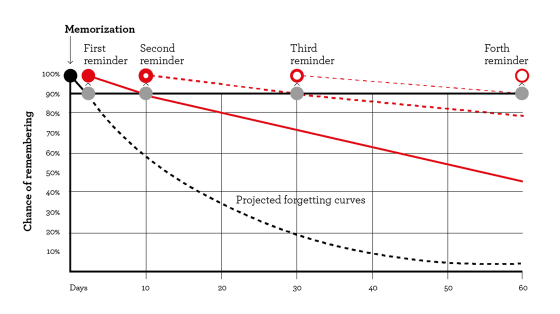In order to accurately and steadily memorize information, 'Interval memory' which repeats after a certain period of time is effective

"Memory" that fixes what you learned, such as school exam preparation and language study, is necessary for every learning. Farnam Street thinks that culture education is a theme that "interval memorization" which remembers again after a certain period of time is effective in order to increase learning efficiency and hold memory reliably.
The Spacing Effect: How to Improve Learning and Maximize Retention
https://fs.blog/2018/12/spacing-effect/
Mr. Ron Hale Evans, author of " Mindhacker " says, "Our memories are" grand "as well as" pathetic. "There is something to do incredibly wonderful work, but as you 'd expect It does not work at all. " Unlike a computer that can memorize a lot of things instantaneously, the human brain demands effort and devotion when trying to memorize something, but to remember it perfectly, the memory operation is repeated at intervals Evans points out that "interval memory" is effective.
It is the German psychologist Dr. Hermann Ebbinghaus who first advocated the effectiveness of interval memory. Dr. Ebinghams has created a "forgetting curve" that graphs how to forget things. In the process of oblivion of the human brain, we forget the rapidly in a very short time and draw a graph like an exponential function that the pace of oblivion becomes gentle if we forget it to a certain extent. However, Dr. Ebinghams found that by increasing the number of times to remember again after leaving an interval, the pace of forgetting can be made very gentle, and it can be thought of almost perfectly.

Dr. Ebinghams also discovered "memorable savings" that a certain amount of information has been stored in the subconscious mind. Information that can not be consciously extracted can also be speeded up by re-learning later, so it is thanks to savings of memories that the effect of iterative learning is enhanced.
About the structure of such a brain Gabriel · Weiner, author of " Fluent Forever " says, "We can think, repeat, remember, imagine, but it is not made to memorize. The brain is designed to hold important things in mind and hold it naturally, "he points out the structural problems of the human brain. For example, if you learn that a tiger is horrible, even if you do not want to keep remembering that "tiger is dangerous", you will not forget the tiger and are organized as information so that you can escape as soon as you encounter it I said.
Also, there is an idea that there is no special part in the brain to preserve memories concerning the mechanism in which interval memory is effective for memory. According to this idea, memory is what is made of the whole brain, it is composed of things divided into various parts and the entire brain. Even in this point, it seems that the mechanism of holding information is different in computer and human brain.
"Eventually the brain learns a single task throughout the network of neurons, but all brain activity is under consciousness and memory work occurs in areas where conscious control is required. Those who do not practice new skills can not get a proper feeling.It can not learn something without effort and deep awareness is born by trying it over and over, making things by striving It is achieved, "says Robert Greyny, author of Mastery .

There seems to be few people who can understand the effectiveness of interval memory experiences, but it is very rare to learn this memory method in the curriculum. Therefore, Farnam Street proposes the following learning routine work to validate interval memory.
· Scheduling to look back at the information - Typically, you set the interval in advance, such as 1 hour, 1 day, every other day, every week, 2 weeks, every month, every 6 months, every year etc. Recheck the information each time.
· To devise a way to organize information <br> It is necessary to save the information again in a form that can be easily recalled in order to perform interval memory learning. For example, flash cards and repetitive software such as " Anki " are valid. By the way, it seems that the act itself of organizing information and writing it on the flash card is also a learning process to look back at the information.
· Track progress progress and improvement by tracking the progress of learning, such as point system to confirm learning outcome embedded in " Duolingo " <br> program with indicators to track progress and setting daily goals It is said that learning effect will increase because you can get the feeling of.
· Setting focused price value <br> If you learn too long time your attention will be distracted and the amount of information that can be learned will decrease. Therefore, in order to intensively study, it is recommended that you keep time for at most 30 minutes and set a reasonable break time during the study session.
Related Posts:







